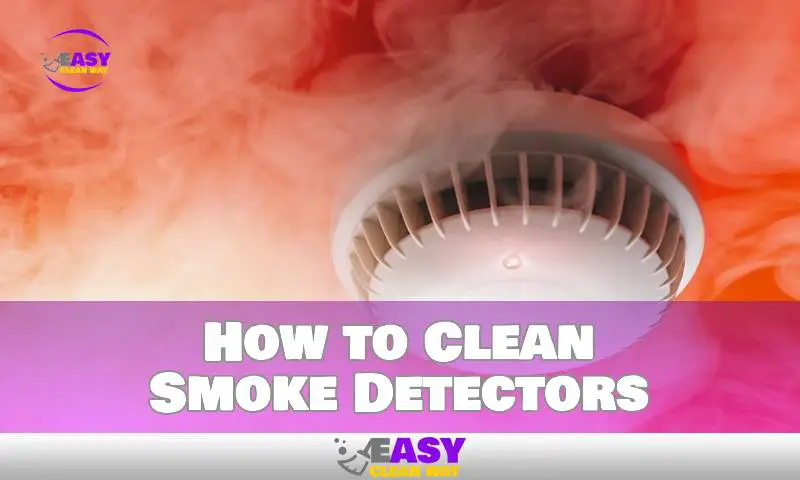To clean smoke detectors, simply remove the cover and gently vacuum the inside and outside of the unit. Use a soft brush attachment to clean the sensors and replace the cover.
Smoke detectors are an essential safety tool in every home, alerting you to the presence of smoke and potential fires. However, like any other appliance, they require proper maintenance to function correctly. With time, smoke detectors can accumulate dust, dirt, and other debris that impairs their performance.
Hence, it’s crucial to clean them regularly. But how do you do it correctly? To effectively clean smoke detectors, you need to follow a few simple steps. In this article, we’ll provide you with everything you need to know about how to clean smoke detectors correctly and keep your family safe.
The Different Types Of Smoke Detectors
Smoke detectors are essential devices that help ensure your family’s safety by sounding an alarm when smoke is detected. It is essential to learn how to clean smoke detectors and maintain them correctly to avoid false alarms and ensure they function properly when needed.
One of the first steps in maintaining smoke detectors is to identify which type you have. In this section, we will explore the different types of smoke detectors, including ionization smoke detectors, photoelectric smoke detectors, and dual-sensor smoke detectors, to help you determine which type is best for your home.
Ionization Smoke Detectors
Ionization smoke detectors are the most common type found in homes, and they work by detecting the presence of smoke or fire through the ionization process. The device contains a chamber with two plates that produce an electrical charge. When smoke enters the chamber, it disrupts the electrical charge, which triggers the alarm.
The advantages of ionization smoke detectors are:
- They are most effective at detecting fast-burning, flaming fires.
- They are less expensive than photoelectric smoke detectors.
- They are widely available and easy to find.
The disadvantages of ionization smoke detectors are:
- They are less effective at detecting slow-burning, smoldering fires.
- They are more prone to false alarms caused by steam or cooking smoke.
Photoelectric Smoke Detectors
Photoelectric smoke detectors work by using a light beam to detect the presence of smoke. When smoke enters the device, it scatters the light beam, which then triggers the alarm.
The advantages of photoelectric smoke detectors are:
- They are most effective at detecting slow-burning, smoldering fires.
- They are less prone to false alarms caused by steam or cooking smoke.
- They are useful in areas with high humidity or where visible smoke may not be present, such as when a fire starts in a wall or ceiling.
The disadvantages of photoelectric smoke detectors are:
- They are more expensive than ionization smoke detectors.
- They may be less effective at detecting fast-burning, flaming fires.
Dual-Sensor Smoke Detectors
Dual-sensor smoke detectors combine ionization and photoelectric technologies to provide enhanced fire detection capabilities. They use both technologies to detect the presence of slow-burning, smoldering fires, as well as fast-burning, flaming fires.
The advantages of dual-sensor smoke detectors are:
- They offer the best of both worlds, providing comprehensive fire detection capabilities.
- They are ideal for detecting fires in all areas of the home.
The disadvantages of dual-sensor smoke detectors are:
- They are more expensive than single-sensor smoke detectors.
Which Type of Smoke Detector is Right for You?
Choosing the right type of smoke detector depends on several factors, including the size and layout of your home, the number of occupants, and the potential fire hazards present. It is recommended that you have both photoelectric and ionization smoke detectors installed in your home for optimal fire detection capabilities.
Knowing how to clean smoke detectors and identifying the types of smoke detectors available is essential for keeping your family safe. With this knowledge, you can choose the best smoke detector to meet your home’s specific needs.
Signs That Your Smoke Detector Needs Cleaning

Smoke detectors, as the name suggests, are designed to alert homeowners in the event of a fire. However, if they are not properly maintained, they can be rendered useless. Regular cleaning is necessary to ensure that they function properly. In this section, we will take a look at the signs that your smoke detector needs cleaning, the different alerts and what they mean, the importance of cleaning your smoke detector, and the risks of not cleaning your smoke detector.
Different Alerts And What They Mean
While smoke detectors are designed to alert people in case of a fire, it is important to understand that they can send out different alerts, and it is essential to be aware of what these alerts mean. Here are some common alerts and their meanings:
- Continuous beep: This alert means that the battery is low, and it needs to be replaced.
- Intermittent beeps: This alert means that the smoke detector is dirty and needs cleaning.
- Short beeps: This alert means that there is smoke or fire in the house.
The Importance Of Cleaning Your Smoke Detector
Cleaning your smoke detector is not only important for ensuring that it functions properly, but it could also save your life. Over time, dust, dirt, and other debris can accumulate inside the smoke detector, leading to false alerts. Cleaning your smoke detector can eliminate these false alarms and help you avoid unnecessary stress.
The Risks Of Not Cleaning Your Smoke Detector
If you neglect to clean your smoke detector, it could lead to disastrous consequences. Fire can spread rapidly, and it is essential to have a fully functional smoke detector. Failure to clean your smoke detector may lead to it malfunctioning, causing it not to alert you in the event of a fire.
Cleaning your smoke detector is essential to making sure that it functions properly and sends out accurate alerts in the event of a fire. Failure to do so poses a significant risk, as it may lead to false alarms, malfunctions, and, worst-case scenario, may fail to alert you in case of a fire.
How To Clean Your Smoke Detector
Smoke detectors are an important safety feature in our homes. They help save our lives by alerting us to the presence of smoke or fire. However, like all appliances, smoke detectors need regular maintenance to function effectively. In this section, we’ll discuss how to clean your smoke detectors to ensure that they are working at their best.
Step-By-Step Cleaning Instructions
Cleaning your smoke detector requires some basic tools and a few simple steps:
- Step 1: Turn off the power to your smoke detector. This is important for your safety.
- Step 2: Remove the smoke detector cover. The majority of smoke detectors have an easy-to-remove cover that can be twisted or pulled off.
- Step 3: Use a soft-bristled brush or a can of compressed air to remove any dirt, dust, or debris from the smoke detector. Be gentle, and avoid poking or damaging the sensors.
- Step 4: Use a damp cloth to wipe down the smoke detector, paying special attention to any sensors. Be careful not to get the smoke detector too wet.
- Step 5: Reassemble the smoke detector cover and turn the power back on.
Tools You Will Need For The Job
To clean your smoke detector, you’ll need a few essential tools:
- A soft-bristled brush
- A can of compressed air or a vacuum cleaner with a soft brush attachment
- A clean cloth
- A ladder or step stool to reach the smoke detector
Common Mistakes To Avoid
Cleaning your smoke detector is a straightforward process, but there are some common mistakes that you should avoid:
- Do not use water to clean your smoke detector. Water can damage the sensors and cause the device to malfunction.
- Do not use harsh chemicals or abrasive materials to clean your smoke detector. These can also damage the sensors and reduce the device’s effectiveness.
- Do not skip the cleaning process. Regular cleaning is essential to ensure that your smoke detector is working correctly.
Tips And Tricks For Making The Job Easier
Cleaning your smoke detector is not a difficult task, but there are some tips and tricks that can make the process easier:
- Clean your smoke detector on a regular schedule. We recommend cleaning your smoke detector at least once every six months.
- Use a soft-bristled brush or a can of compressed air to clean the sensors gently. Avoid touching or poking the sensors.
- Consider replacing your smoke detector if it is over ten years old or has been damaged in any way.
- Test your smoke detector after cleaning to ensure that it is working correctly.
By following these simple steps, you can keep your smoke detector clean and functioning properly. Remember, regular maintenance is key to ensuring that your smoke detector works when you need it most!
Maintaining Your Smoke Detector

How Often To Clean Your Smoke Detector
Regular cleaning of your smoke detectors is essential to ensure they function correctly. Here are a few key points to keep in mind when it comes to maintaining your smoke detector:
- It is recommended to clean your smoke detector at least every six months to ensure that it’s functioning correctly.
- If, however, your smoke detector is installed in an area where it is exposed to dust or other types of contamination, it may require more frequent cleaning.
- Be sure to read the manufacturer’s instructions for your smoke detector before cleaning it, as different models may require different cleaning methods.
- When cleaning your smoke detector, make sure to use a soft brush or vacuum to remove any dust or debris that may have accumulated on the sensor.
Additional Maintenance Steps To Take
In addition to regular cleaning, there are a few other maintenance steps you can take to ensure that your smoke detector is always working correctly:
- Test your smoke detector regularly to ensure that the batteries are working properly and the alarm is functioning correctly. You can do this manually by pressing the test button on the device.
- Be sure to replace the batteries in your smoke detector every six months, or sooner if the unit starts chirping, indicating a low-battery warning.
- Keep your smoke detectors free of any obstructions, such as curtains or furniture, which may interfere with the device’s ability to detect smoke.
- If your smoke detector is hard-wired, make sure that the wiring and interconnecting cables are intact and free from any damage.
When To Replace Your Smoke Detector
While regular cleaning and maintenance can help extend the life of your smoke detector, you should also know when it’s time to replace the device. Here are a few things to keep in mind:
- Smoke detectors typically have a lifespan of around 10 years. After that time, the sensors may become less sensitive, and the device may not function correctly.
- If your smoke detector is emitting false alarms or not sounding an alarm when there is smoke present, this may be an indication that it needs to be replaced.
- Be sure to replace your smoke detector if it has been damaged in any way, for example, if it has been dropped or exposed to heat or moisture.
Regular maintenance of your smoke detectors is essential to ensuring that they work correctly in the event of a fire. Clean your smoke detector every six months, make sure to replace the batteries regularly, and keep the device free from any obstructions.
Finally, be sure to replace your smoke detector when necessary to ensure maximum safety for you and your family.
FAQ
How Often Should Smoke Detectors Be Cleaned?
It is recommended to clean smoke detectors once every six months. Regular cleaning ensures the proper functioning of smoke detectors, which are essential for detecting smoke and preventing fire hazards.
How Do I Clean a Smoke Detector?
To clean smoke detectors, first, turn off the power source. Next, remove the cover and gently vacuum around the device to remove dust and debris. Wipe the exterior of the detector with a damp cloth. Do not use cleaning sprays or solvents.
Can a Smoke Detector Be Cleaned With Water?
No, it is not recommended to clean smoke detectors with water. Only use a damp cloth to wipe the exterior and avoid getting the interior components wet. Water can damage the smoke detector and reduce its effectiveness.
What Happens If the Smoke Detector Is Not Cleaned?
Not cleaning a smoke detector can compromise the effectiveness of the device. Dust and debris can collect on the sensor, causing false alarms or preventing the detector from working altogether. Regular cleaning is important to maintain the reliability of smoke detectors.
Can I Clean a Smoke Detector Myself or Should I Hire a Professional?
A smoke detector cleaning is a straightforward task that a homeowner can complete. As long as the power source is turned off and care is taken not to touch the sensor, it can be safely cleaned. However, if you are uncomfortable doing it yourself, consider hiring a professional.
Conclusion
Maintaining smoke detectors in good condition is of utmost importance for the safety of you and your loved ones. Regular testing and cleaning can help avoid false alarms and ensure that the device works when needed. By following the simple steps discussed in this article, you can clean your smoke detectors and extend their lifespan.
Regular cleaning will remove dust and other debris, which can affect the device’s detection capabilities, and increase its accuracy in detecting smoke. Do not forget to replace the batteries twice a year and schedule an annual replacement of your detector to ensure that it is always in good working condition.
Remember, a few minutes of your time can prevent major disasters and potentially save lives. So why wait? Clean your smoke detectors today to stay safe tomorrow.
Hey there! I’m Alton Smith, your Clean Expert blogger. I’m on a quest to help you conquer chaos and embrace the joys of a tidy life.





